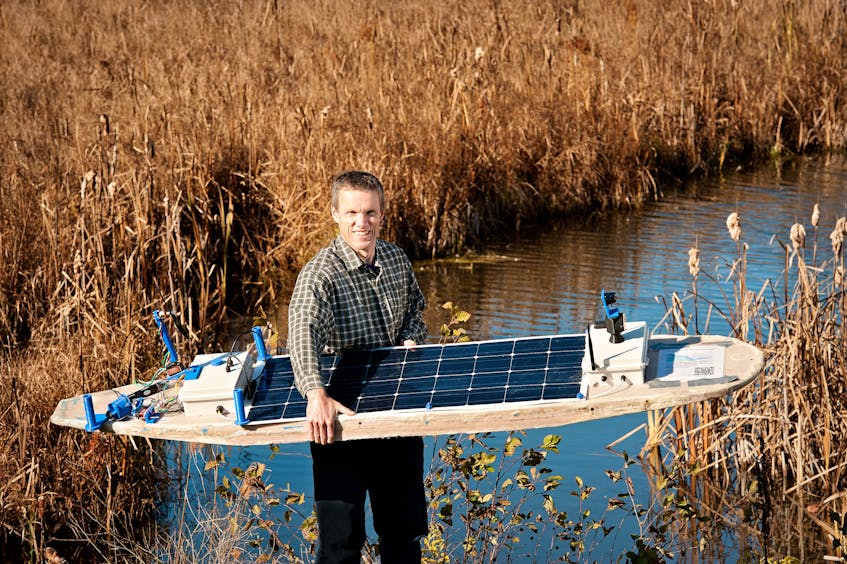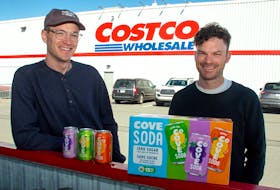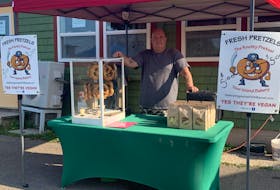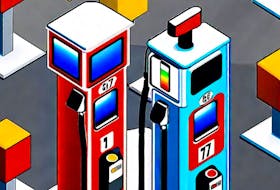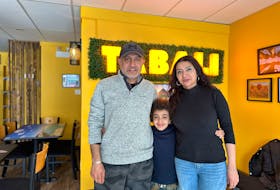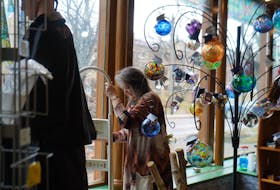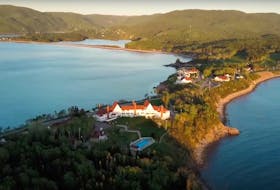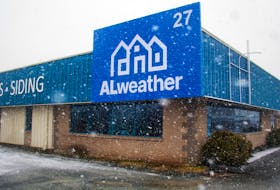Murray Lowery-Simpson has been fine-tuning his solar-powered water-sampling system since 2018.
Today his creation, dubbed AMOS for “aquatic mini observation system”, is a third-generation prototype.
If all goes according to plan, the New Brunswick-based inventor will have three final versions of AMOS produced and ready to be put to the test by business clients early next year.
Lowery-Simpson got a boost on Sept. 30 to help his invention reach market potential a little faster.
His company, In Nature Robotics, was one of 14 chosen in the Ocean Startup Challenge — a competition by Canada’s Ocean SuperCluster — to receive $25,000 to develop their ideas.
The Ocean Startup Challenge was originally intended to award just 10 project grants.
However, the ideas were just too good to narrow down to 10, said Don Grant, executive director of the Ocean Startup Project. So the selection committee chose 14.
"The judges looked for the best of the best across varied market sectors, geography and technology readiness," said Grant in a press release. "The innovators wowed us with their passion for entrepreneurship and overcoming problems facing our oceans."

Ideas for the Ocean Startup Challenge were pitched by 158 companies from around the world.
The 14 winning companies represent start-ups from British Columbia, New Brunswick, Newfoundland and Labrador, Nova Scotia, Ontario, Prince Edward Island, and Washington, D.C.
“The winners of the Ocean Startup Challenge showed strong potential to build globally competitive, market-focused solutions,” said Melody Pardoe, Chief Engagement Officer of Canada’s Ocean Supercluster, in a Sept. 30 release.
Pardoe added the Ocean Startup Challenge sought companies that would thrive in Atlantic Canada's ocean tech ecosystem and would potentially find new partners or customers there.
Lowery-Simpson, who has a background in software development and mechanical engineering, told SaltWire his invention aims to make it easier to carry out the task of monitoring water systems for industries that need to do that regularly.
“A number of industries are forced to do water sampling,” he said. “It’s required for mining operations, for instance, to monitor tailings ponds to ensure levels of pollutants are within limits.”
Right now, he said, collecting water samples and data is a time-consuming process. It requires a person to go to the location to use a probe to collect data, or to collect physical water samples to bring back to a laboratory for analysis. And that work could involve actually getting into a small boat to do the collection, adding risk as well as more time to the process.
Lowery-Simpson thinks his invention could reduce the risk and the time involved.
Like many ideas, this one was inspired by a real-life problem.
The inventor said he began thinking about solutions for water sampling after news reports in 2017 about contaminants in the water at Parlee Beach Provincial Park, a popular swimming area on the east coast of New Brunswick.
“At the time the sampling process they were using was fairly time-consuming. Someone would have to go to the location, collect a water sample, and drive it back to a lab in Fredericton and it would take a day or two, or longer, to get the results.”
He started toying with the idea of a miniature boat that could be powered by solar and carry a probe system that could collect water data and transmit the information back to a lab via a wireless USB stick using cellular service.
The first prototype was a bit crude, he chuckles.
“It was actually a small beer cooler in the shape of a kayak, designed to tow behind another kayak,” he says. He subsequently used a surfboard design as the platform for the floating lab.
His current prototype, measuring six feet long and weighing just 13 kilograms, uses a catamaran design. Powered by solar it can be managed by an onshore operator. The on-board technology is, essentially, an underwater probe to collect and analyze water data.
He says the prize money from the Ocean Startup Challenge will help him expand the testing of his latest prototype and perhaps hire someone else to help with that testing.
“Right now it’s just me going out in a kayak monitoring and testing the boat. So having someone else to occasionally do that, to work out possible bugs that I haven’t noticed, would be a help.”
He also envisions the next level for his system.
With some more research and development, he said, AMOS could also be upgraded to collect actual water samples – imagine a mini CanadaArm-like attachment — to provide more water quality data to companies and researchers who need this information.
Collagen from Cod
Meanwhile, in Main Brook, on Newfoundland’s Great Northern Peninsula, Ben Wiper has been pondering how to prevent fish waste from being dumped in the ocean by creating high-value products.
Wiper’s company is, appropriately, called 3F Waste Recovery, with the F standing for fish, farm and forest.
The focus of his pitch to the Ocean Challenge Startup was fish, specifically extracting collagen from the skin of cod for use in the pharmaceutical industry.
“You can make collagen from all sorts of fish skins,” he said, “but cod collagen is, by far, the best.”
Wiper has been working on this idea for about three years, he told SaltWire.
“I’ve been digging into what are the most abundant natural resource waste materials that have the highest-value applications.”

His idea is not unique.
In researching a solution to divert the waste from fish processing from the ocean he discovered an entrepreneur from Iceland who pioneered the process of protein extraction from fish waste 40 years ago.
Wiper figured there was no reason the Icelandic model couldn't work here.
In the pharmaceutical industry, Wiper noted, collagen from cod has application in skin grafts, injections and pill encapsulation.
Collagen extraction is a highly-technical process — the equipment includes a centrifuge to separate the collagen from the cod waste — with the end product being a collagen-rich powder.
Currently, the pharmaceutical industry uses collagen mainly from other animal sources, like pigs, said Wiper.
Collagen from cod, he says, provides for better absorption of the active medicinal ingredient in a pill.
“The cod collagen specifically is the smallest collagen molecule on earth. And when you wrap that collagen around a medicine it connects to that medicine and drags it into your bloodstream,” he explained.
Wiper’s business idea is still in the pre-commercial stage but he says he’s already got significant interest from a potential buyer.
"We’re planning to go into final scale production at the Marine Institute early in 2021."
“I’ve got a strategic customer interested in buying all the collagen I can make,” he said.
“What we have to prove to this potential customer is that our process can produce the collagen to their specification and that not only can we make it with our team and equipment, but it can be produced by another team using our equipment.”
The end goal, said Wiper, is to have the equipment and a process that can be patented for commercial use by any company.
To develop his product Wiper is working with the College of the North Atlantic to develop the equipment to remove the skin from cod.
“We actually just built our first prototype for testing,” he said.
Wiper also has a partnership with a processing company to put the equipment to the test, and another academic institution is playing a role in his goal.
“We’re planning to go into final scale production at the Marine Institute early in 2021,” he said.
He said the $25,000 from the Ocean Startup Challenge “makes all the difference in the world” to get his idea off the ground.
The Ocean Startup Challenge winners
- 3F Waste Recovery (Main Brook, NL) is a life sciences manufacturer focused on value-adding local fisheries and natural resource waste streams into natural food, cosmetic and pharmaceutical ingredients.
- Blue Lion Labs (Waterloo, ON) is providing fish farmers with an early warning sign of a sea lice event by using an underwater camera system powered by artificial intelligence.
- Glas Ocean Electric (Halifax, NS) is building electric boat kits to convert existing and new boats to electric propulsion and is developing opportunities to dual-purpose boat batteries as dynamic energy storage.
- Grand River Robotics (Waterloo, ON) focuses on developing highly optimized robotic inspection platforms with connected web-based data back ends. Their AUV is an underwater robotic autonomous IOT solution that will minimize loss of fish through frequent and complete imaging of fish nets to ensure the rapid repair of holes.
- In Nature Robotics (Hanwell, NB) designs and manufactures lightweight, low-cost, solar-powered, autonomous airboats for inland and coastal water monitoring and surveying applications. Their boats are built to be simple and straightforward to operate, easy for users to customize with add-on equipment, and reliable in operation.
- Kavacha.ca (Canoe Cove, PE) uses fish waste to provide active protection to marine industries through direct-to-metal coatings in harsh environments. Their solution saves users more than 30% on material and labour, while increasing or maintaining asset lifetime, reducing toxin exposure/imprint, and providing a high-volume value add for a fishery waste stream.
- Marecomms Inc. (Halifax, NS) designs and builds robust and broadband wireless communication solutions for maritime environments. Their first underwater wireless communication product, RObust Acoustic Modem (ROAM), has been put to numerous tests in challenging ocean environments in the North Atlantic and shown to offer nearly 200 times faster connection speeds than the existing solutions with significantly enhanced reliability.
- qualiTEAS (St. John’s, NL) is a corrosion inspection service company developing an AI-integrated image analysis software for near-real-time detection of corrosion and cracks on subsea assets.
- SeaChange Biochemistry Inc. (Clark’s Harbour, NS) creates chemicals for industry from sustainably harvested seaweed through an innovative biorefinery process.
- SeaHawk Robotics (Vancouver, BC) develops and operates multi-domain UAV-based ocean observation systems that disrupt current paradigms by improving access, increasing safety, and reducing costs of data collection.
- Subait Inc. (Dartmouth, NS) takes a scientific approach to develop a superior sustainable lobster bait substitute based on seafood co-products, replacing environmentally challenging commercial bait fish species.
- Tracker Inventory Systems (Sydney, NS) provides aquaculture and seafood processing facilities automated inventory systems to reduce operating costs and provide production visibility for management and sales. Their solution uses computer vision technology to automate data entry, which eliminates manual and error-prone processes.
- Virgil Group LLC (Washington, D.C.) is developing groundbreaking legal fisheries analysis software that goes beyond traceability to tackle this essential question in responsible seafood.
- WeavAir (Toronto, ON) provides an end-to-end hardware and software solution for vessel emission monitoring by using predictive algorithms that promote regulatory compliance and operation costs savings for ship owners, ship managers and port operation teams.
Source: Ocean Startup Challenge
About the Ocean Startup Challenge
The Ocean Startup Challenge was a competition designed to support innovators who are developing technologies that can be applied to large ocean challenges. The Challenge is led by the Ocean Startup Project, the first Innovation Ecosystem Project announced by Canada's Ocean Supercluster.
The Ocean Startup Project is a pan-Atlantic collaboration to create and grow high-quality ocean technology companies and attract more ventures to the region's ecosystem. Collaborators include Creative Destruction Lab (CDL) - Atlantic, Genesis, Innovacorp, New Brunswick Innovation Foundation, PEI BioAlliance, and Springboard Atlantic.
In-kind supporters of the Ocean Startup Challenge include BDO Canada, Enginuity, IGNITE, McInnes Cooper, Propel, and Saint Mary's University Entrepreneurship Centre.
Source: Ocean Startup Challenge

